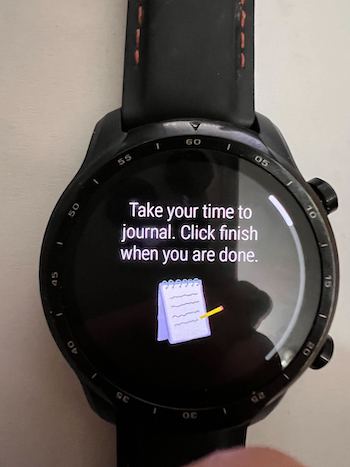In This Story

George Mason University researchers Vivian Motti and Anya Evmenova are utilizing smartwatch capabilities to help neurodiverse individuals live more independent lives.
With the support of a $712,774 grant from the U.S. Department of Health and Human Services, they have developed a smartwatch application that will help improve the daily lives of young adults with intellectual and developmental disabilities.
The team has started a pilot study of the app with 20 individuals in the Washington, D.C., metropolitan area, and are looking to add more. The study participants are college-age people with intellectual and development disabilities; each receives a smartwatch and phone to use with the study. The researchers said they are getting a lot of interest from parents.
“This project is helping us identify ways wearable technology can support young adults with intellectual and development disabilities in regulating their emotions while completing a task in the learning or employment environment without overreliance on the support staff,” says Evmenova, professor of special education and disability research in the College of Education and Human Development.
The app uses sensor data—heart rate, movement levels, hand motions—from a smartwatch to understand when the wearer needs some kind of intervention. This intervention is a suggestion, such as “Take a drink of water” or “Listen to music,” which is based on information gathered from the individual participants regarding their preferences on ways to calm themselves.
“[The participants] are excited to use the watch, and many say they enjoyed the interventions,” said Motti, who is an assistant professor in Mason’s College of Engineering and Computing.
With the support of a consultant, Heidi Graff, the researchers meet with the study participants weekly. “It has become sort of a focus group,” said Motti. “They really like to see one another.”
Most of the initial interventions were based on classroom or employment scenarios, but Motti said they had heard from one participant that she wished she had worn her watch to a Washington Nationals game. She was at a game in July 2021 when gunshots were fired outside of the stadium, and people inside the stadium had to shelter in place. She felt she really could’ve used the smartwatch then.
Motti and Evmenova found this information valuable as they would like to encourage use of the app outside controlled scenarios.
Motti said one of the biggest challenges working with these populations is the lack of data. “We just don’t have well-established metrics. We are mainly relying on first-person views and perspectives.”
The back end of the app was developed with the help of the Office of Scholarship, Creative Activities, and Research (OSCAR) student Leela Hymava Yaddanapudi, who is majoring in computer science. Graduate research assistants Niloofar Kalantari and Anika Binte, both PhD students in information technology, helped with the design the interface.
Long-term goals for the project including making the app widely available. Another grant would be needed to help maintain the system that system that supports the technology.
“Technology levels the playing field and allows new opportunities for all individuals regardless of their abilities and needs,” said Evmenova. “Dr. Motti and I are both passionate about developing new technology-based and universally designed solutions for all.”
